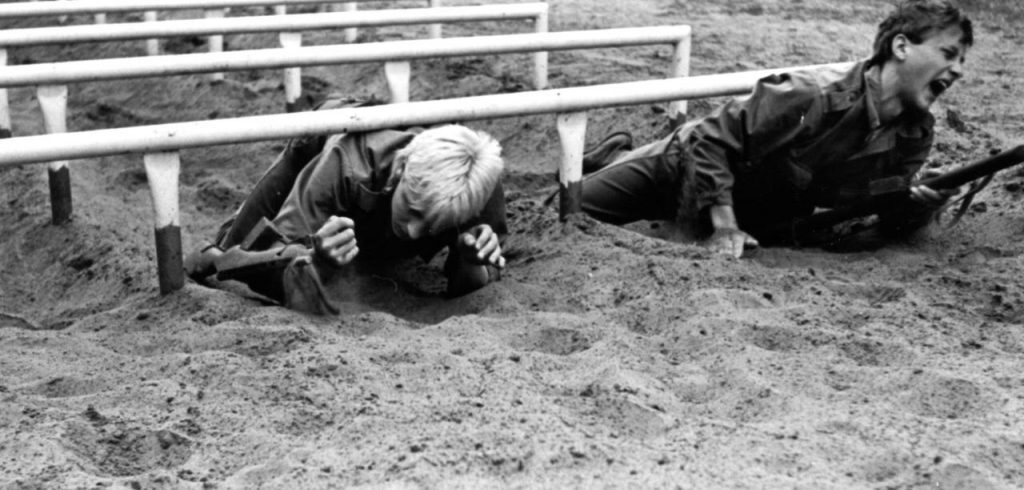August 1989, and we were the “last legion” to be trained in one of East Germany’s paramilitary camps – one of the things that had become part and parcel of growing up in East Germany. Now we were there for a last time, though we didn’t know that yet.
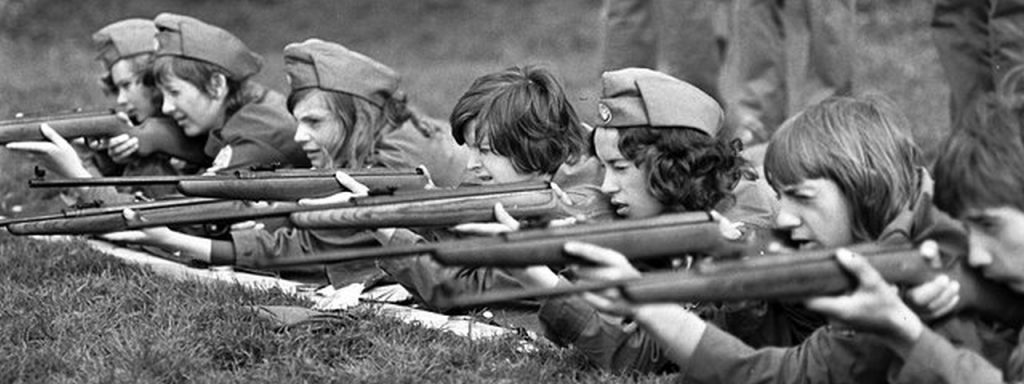
As a boy you’d go to one of those camps twice for two weeks during your summer holidays (sic!). The first time was at age 15/16 after grade 9, and then again at age 17/18 after grade 11 – provided you were healthy. The whole thing was organized through your school, and a grade would turn up in your certificate. Although rumour had it that attending the camp was voluntary, a missing or bad grade in your certificate could always be used against you in the future, we were sure. Some boys joined the girls who didn’t go to those camps but undertook a two-week training in first aid and general emergency and rescue missions. They would keep us alive after an always pending nuclear strike by western imperialists, or such were the government’s phantasies. Boys whose parents did not want them to go were often declared ill in one way or another, usually by a GP who was family or a family friend. Geringer Blutgerinnungsfaktor, a low anti-hemophilic factor, was a convenient diagnosis to keep you away from military services, as we all knew. Others were actually ill or otherwise “unfit”.
The training comprised everything typically associated with the military, all that fancy nonsense that teaches you submissive behaviour (“discipline”) and masculine competitiveness (“courage”) and various “skills”, for what they’re worth. We’d be given uniforms, were organised in some hierarchy or other, march around in platoons, played an adult version of hide and seek in the bushes, would throw imitation hand grenades (the famous “F1”!), and fire actual rounds with not always reliable AK47s. I think I’d still be able to take an AK47 apart, clean and reassemble it. Who knows, that skill may still come handy one day! I must say I enjoyed firing an AK47 at age 15 – honestly, who wouldn’t? However, in the course of the following years my views changed.
What was less enjoyable were the casualties – I mean, put a few hundred fifteen- or seventeen-year olds in a camp, what do you expect? The first time round, in Arendsee after grade 9, one guy lost his finger tip, another one his vision in one of his eyes (a broom, stick first, fired at him), and one guy had a bullet from an airgun in his leg. That’s only what happened in our and our neighbouring platoon.
This last time, after grade 11, we went to Prerow at the coast of the Baltic Sea. Two people accompanied us that could not have been more different: one of our teachers from EOS Humboldt, the kind of teacher you suspected was under observation by the Stasi; the other one a former pupil of the same school, now member of a certain elite unit in the army – naturally, we were not given any specifics. The former was responsible, strangely enough, for classes on politics during which he would close the window blinds allowing us to simply sleep through the session, or would organize a movie night showing All Quiet on the Western Front (1979) out of all movies! In its German version, the orders were exactly the same as ours in the camp since the East German Volksarmee had adopted the Prussian army code with no or little modification. The latter, our special-forces darling, had taken holidays from the army to do this training with us, so dedicated he was. He made sure to leave an impression on us on day one by leaving us standing in the rain in the one and only uniform each of us had been given and which it was very hard to dry again in our rather moist bungalows. Walking through each bungalow, he inspected the lockers and reminded us of “Prussian tidiness”, which came as a surprise since it was the Russians not the Prussians that were officially venerated! It was to be one of the arguments that eventually led to the guy’s discharge from the camp.
What happened? One day he had us, all 80 or so in our platoon, do morning exercises, then the regular marching drill, followed by running 3,000m in the deep sand of the paths through the nearby forest. It may have been 10 or 11 a.m. by then, and he chose to let us march quickly some 5km into the bush to do some fancy crawling through the dust amidst blueberries and moskitos. He must have got carried away by the sight of 80 young guys doing such smart exercise, and all of a sudden he realized we wouldn’t make it back to the camp in time to catch lunch, thus he gave the order to run back those 5km. The first few cohorts (we were in marching order) mostly comprised of those who’d already chosen an army career. In my school, there were usually two of them per class (and may I add there was nothing wrong with ours!). They started running while the rest of us remained standing in protest. A proper mutiny! Once that guy noticed what was going on, he returned, and there was some shouting and whatnot, but eventually he found himself running on his own. We walked back in our own time, and most importantly: we did get some lunch still! For some reason, and not quite untypical of my years at school, I had been made the speaker of that platoon. The same afternoon I sat down and with the support of our dissident politics teacher wrote a complaint about that special-forces officer (what was his name?, I wish I could remember). It included everything, from wet uniforms to his questionable appraisal of Prussian traditions to his obvious lack of qualification as a unit leader. Well, the letter worked like magic. The next morning he was gone, never to be seen again.
From then on the camp was more enjoyable. In-between boring drills we were requested as a security force for a two-day music festival called “Bambule an der Küste” (which translates as something like ‘craziness along the coast’) which took place next to our camp. Boy, did we enjoy that! Although most of us had a rather dispassionate relationship with East German music and East German “stars”, they were stars nevertheless, and I remember being somehow impressed by the fact that guys like Dirk Zöllner conveniently used the showers in our camp.
I also have fond memories of this camp for getting to know Frank Giering, or “Willy” for us. May his soul rest in peace. Willy became quite a movie star, Baader surely one of his biggest successes. And then, somehow, at age 38, he didn’t make it anymore.
May I note that after the Wall came down and East Germany was in a state for not being much of a state anymore (the pun’s in the word, not of my making, come on!), I came in contact with the military again for I had to go for mustering. In fact, it was the second time in my life that I had to go there. I had a bit of a history with the military by then. When at the end of grade 11 all the boys of my class were to attend a meeting with the school rector, our class teacher, parents and two army representatives, we were meant to be drafted for 25 years (“a career as an army officer”, yay!), or four, but at least three years. My meeting did not go well, to say the least. For one, I kept insisting that the minimum military service of a year and a half was enough for me. Moreover though, the army guys learnt from me that many of our school’s future candidates for officers careers were neonazis, a fact that the school’s rector could not deny, much to his dismay. I knew what I was talking about, whether they liked it or not. Would I join such company? No. Eventually, when asked for differences between our East German officers or army at large, and those of the west, my response was that, apart from some minor doctrinal aspects, there weren’t any truly. It almost cost me my degree, and my class teacher had to sit down with me several times to do whatever they thought she, a kind elderly lady, should do.
Unsurprisingly then, my first mustering also ended in a, how shall I say?, rather unharmonious conversation with the responsible officer. Some minutes into that conversation about the army and its role in our state and so on, which means some minutes into me speaking my mind, too, I was told, or almost shouted at, that I would not be sent to serve at the border. Result! That’s what I wanted. I made it quite clear to them that I found shooting at human-shaped targets, as was our practice in those paramilitary camps, completely out of order. Not to mention firing at an actual human being, notably one fleeing East Germany, and that was what you were expected to do at the border to West Germany.
The camp was abandoned a few years after the Wende, and it seems to be in ruins today. Below some recent impressions by others, notably by Werner Kirsch (picture source).
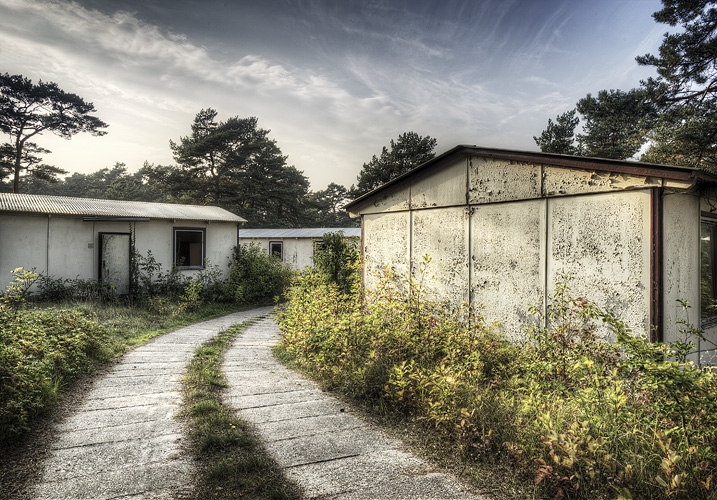
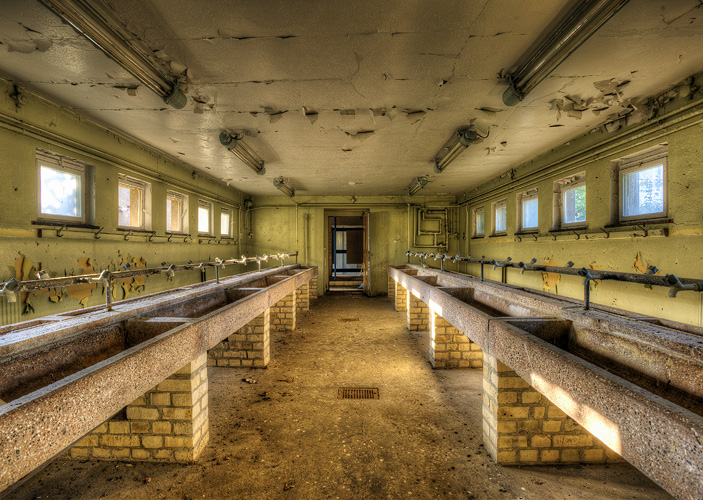
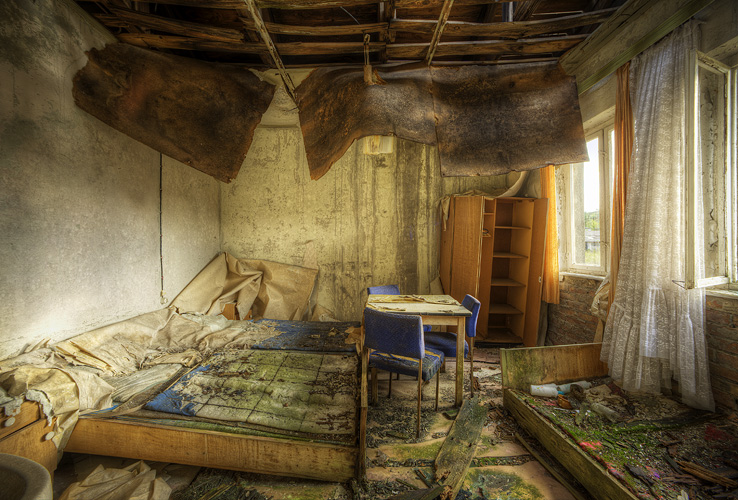
Links
A report on the GST Lager Prerow in German here.
Gallery GST Lager Prerow (of 2014)
Another gallery
https://www.mdr.de/zeitreise/gst-104.html
https://www.bbglive.de/2012/01/25/zv-wehrunterricht-in-bernburg-war-teil-der-ddr/
http://www.christian-sachse.de/20120627_Wehrerziehung_Erfurt.pdf

